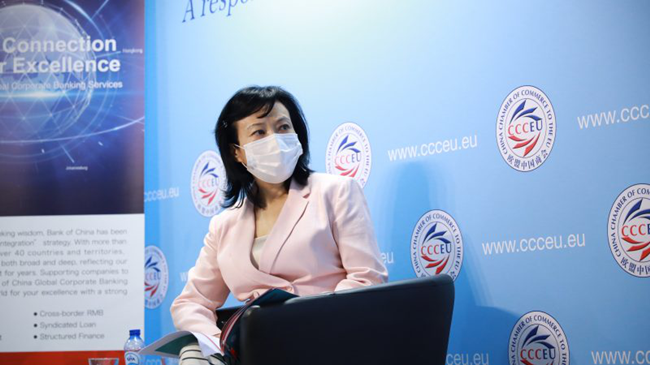Chinese companies' concerns need to be heard and addressed

Ms Zhou Lihong, Chairwoman of the CCCEU, delivered an address during the launch of the CCCEU 2020 Recommendation Report, held in Brussels on 10 September 2020 [CCCEU]
This article is part of our special report EU and China: Charting a new relationship.
This is an extraordinary year, clearly, because of COVID-19: the pandemic is wreaking havoc on economies and our businesses are struggling to weather the fallout.
Zhou Lihong is the Chairwoman of the China Chamber of Commerce to the EU.
Our memory is still fresh: when China was hit by the virus, Europe came to help, providing succour to Chinese people in extreme difficulty. Later, when the virus hit Europe, Chinese businesses and people rushed to reciprocate.
In this mutual support, I see the shared culture of helping each other in difficult times, as well as the foundation of a stronger Sino-EU partnership.
In May, the CCCEU started to work with Roland Berger to conduct in-depth interviews and surveys of Chinese enterprises operating across Europe. We asked how they dealt with the pandemic, how they evaluate the current environment for the ease of doing business, what their concerns were, and their proposals for smoother bilateral business relations.
Their responses, to some extent, surprised me: when headline news was all about measures to secure economic growth and help businesses, Chinese companies in Europe faced a tougher environment and less welcoming policies.
The stress came from political, macro and industry-specific sectors, as well as the talent market. They felt policies from Brussels and European capitals were less favourable to them at a time when investment and inputs were urgently needed.
For instance, tighter screening measures, and possible legislation on foreign subsidies, plus an antitrust review are looming, Some members of our chamber are calling the complex review regime "three huge mountains" to climb.
We are deeply concerned that Europe will continue to adopt a "conservative" approach to foreign companies, including Chinese ones. We worry that some policies are set to lead to unprecedented uncertainties for Chinese companies.
The CCCEU and Roland Berger on Sept. 10 launched our annual report, a recommendation report for EU institutions. Our report carries great hope by the CCCEU and our nearly 70 members that cover around 1,000 Chinese companies in Europe.
We hope the EU strengthens the political will to raise mutual trust with China and increase alignment in long-term objectives and policy planning. It is the best time to do so: Beijing is preparing its 14th Five-Year Plan (starting next year) and the modernization scheme for 2035; while Brussels is in a green and digital transition and setting the stage for a two-year conference on the future of Europe.
We hope the EU prevents the spillover and politicization of cybersecurity issues, and we call on the EU to initiate a thorough dialogue with China and sign agreements on mutual trust.
We urge the EU to refrain from overregulation and excessive screening, as well as all forms of trade and investment protectionism.
We hope Brussels will encourage and allow Chinese companies to participate in the EU's adoption of industry standards and technological R&D standards.
We outlined eight major policy recommendations and hope our voices will be heard in Brussels and European capitals.
Next Monday, Chinese President Xi Jinping will attend a China-Germany-European Union (EU) leaders' meeting via video link. He will be in talks with German Chancellor Angela Merkel, President of the European Council Charles Michel and President of the European Commission Ursula von der Leyen.
At this historic juncture, we hope our recommendations contribute to a more consistent and predictable macro-policy framework, one conducive to the development of Chinese companies in Europe.
We hope the EU and member states pay close attention to the voice of Chinese companies and provide a more consistent and predictable macro-policy framework for their development.
We hope for change.
EURACTIV's editorial content is independent from the views of our sponsors.

 Login
Login Login
Login CCCEU and Gunnercooke Successfully Host Webinar on CSDDD and FLR Compliance to Guide Chinese Businesses
CCCEU and Gunnercooke Successfully Host Webinar on CSDDD and FLR Compliance to Guide Chinese Businesses Cultivating responsible China-EU business leaders essential to tackling global challenges
Cultivating responsible China-EU business leaders essential to tackling global challenges



